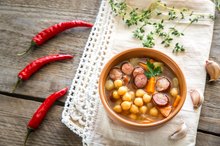Why Can You Not Take Cranberry Juice When Taking Warfarin?
Cranberry juice seems like a healthy drink, rich in antioxidants and vitamins. In most cases, drinking cranberry juice will not cause any health problems, but there is one situation in which cranberry juice may be dangerous. People who take the drug warfarin—also known by the brand name Coumadin—may have trouble with blood clotting if they also drink cranberry juice.
About Warfarin
Warfarin is a prescription medication, which makes the blood clot more slowly. While often called a “blood thinner,” it doesn’t really change the consistency of the blood. Warfarin blocks the formation of vitamin K factors that help the blood to clot. Keeping the level of vitamin K in balance while taking warfarin is very important, because if the vitamin K level seesaws up and down, your warfarin dosage may not be able to accommodate this. Frequent changes in the warfarin dosage make it harder for your body to get used to the medication effects. When you are on warfarin, what you eat and drink is also very important. Foods that are high in vitamin K, such as green leafy vegetables like spinach, broccoli and lettuce, can also affect the vitamin K level in the blood. Cranberry juice is another food that can interfere with warfarin.
Cranberry Juice and Warfarin
Grapefruit & Celexa
Learn More
Cranberry juice contains a considerable amount of salicylic acid—an important ingredient in aspirin. When you drink cranberry juice—or eat other cranberry food products—on a regular basis, it can increase the amount of salicylic acid in your body. Since this substance can prevent blood clotting, according to Medline Plus, it may cause interactions with warfarin, which also prevents clotting. Cranberry juice may also decrease how quickly medications such as warfarin are broken down by the liver, and this is another way it may affect the INR, or International Normalized Ratio, which is used to determine how much warfarin should be given to a person each day.
The Research
However, the literature on this subject has not been clear. The Cranberry Institute has investigated the issue of cranberry and warfarin interaction and while it felt the potential for interactions was slight, it has issued a press release that discusses the issue and recommends people discuss dietary changes with a healthcare professional. One study reported in the "Journal of The American Dietetic Association" in May 2006 found no significant changes in the INR when male patients who had been stable on warfarin were given 250 milliliters of cranberry juice a day. But that study also notes there have been case reports in the literature where cranberry juice did seem to interact with warfarin. PubMed notes that people may respond differently to warfarin based on their genetic makeup or heredity.
Considerations and Warnings
Cayenne Pepper and Warfarin
Learn More
While cranberry juice may not be a problem for some people, especially in small amounts, warfarin is a medication with potentially serious side effects. PubMed recommends you not make major changes in your food patterns, such as going on a diet, without first discussing them with a healthcare professional.
Related Articles
References
- “Circulation”; A Patient’s Guide to Taking Coumadin/Warfarin; Karen Fiumara, Pharm.D.; Samuel Z. Goldhaber, M.D.;2009
- "Journal of the American Dietietic Association”; Cranberry Does Not Affect Prothrombin Time in Male Subjects on Warfarin; Z. Li, N.P. Seeram, C.L. Carpenter, G. Thames, C. Minutti,S. Bowerman; December 2006.
Writer Bio
Beth Greenwood is an RN and has been a writer since 2010. She specializes in medical and health topics, as well as career articles about health care professions. Greenwood holds an Associate of Science in nursing from Shasta College.









